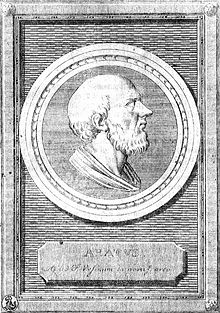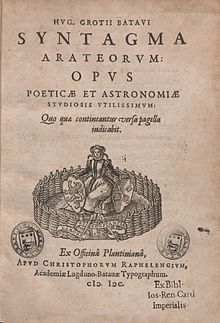astro.wikisort.org - Researcher
Aratus (/əˈreɪtəs/; Greek: Ἄρατος ὁ Σολεύς; c. 315 BC/310 BC – 240) was a Greek didactic poet. His major extant work is his hexameter poem Phenomena (Greek: Φαινόμενα, Phainómena, "Appearances"; Latin: Phaenomena), the first half of which is a verse setting of a lost work of the same name by Eudoxus of Cnidus. It describes the constellations and other celestial phenomena. The second half is called the Diosemeia (Διοσημεῖα "Forecasts"), and is chiefly about weather lore. Although Aratus was somewhat ignorant of Greek astronomy, his poem was very popular in the Greek and Roman world, as is proven by the large number of commentaries and Latin translations, some of which survive.

Life
There are several accounts of Aratus' life by anonymous Greek writers, and the Suda and Eudocia also mention him. From these it appears that he was a native of Soli[1] in Cilicia, (although one authority says Tarsus). He is known to have studied with Menecrates in Ephesus and Philitas in Cos. As a disciple of the Peripatetic philosopher Praxiphanes, in Athens, he met the Stoic philosopher Zeno, as well as Callimachus of Cyrene and Menedemus, the founder of the Eretrian school.
About 276 BC Aratus was invited to the court of the Macedonian king Antigonus II Gonatas, whose victory over the Gauls in 277 Aratus set to verse. Here he wrote his most famous poem, Phenomena. He then spent some time at the court of Antiochus I Soter of Syria, but subsequently returned to Pella in Macedon, where he died sometime before 240/239.[2][3] His chief pursuits were medicine (which is also said to have been his profession), grammar, and philosophy.
Writings
Several poetical works on various subjects, as well as a number of prose epistles, are attributed to Aratus, but none of them have come down to us, except his two astronomical poems in hexameter. These have generally been joined as parts of the same work; but they seem to be distinct poems, the first, called Phenomena ("Appearances"), consists of 732 verses; the second, Diosemeia ("On Weather Signs"), of 422 verses.
Phenomena


The Phenomena appears to be based on two prose works—Phenomena and Enoptron (Ἔνοπτρον, "Mirror", presumably a descriptive image of the heavens)—by Eudoxus of Cnidus, written about a century earlier. We are told by the biographers of Aratus that it was the desire of Antigonus to have them turned into verse, which gave rise to the Phenomena of Aratus; and it appears from the fragments of them preserved by Hipparchus, that Aratus has in fact versified, or closely imitated parts of them both, but especially of the first.
The purpose of the Phenomena is to give an introduction to the constellations, with the rules for their risings and settings; and of the circles of the sphere, amongst which the Milky Way is reckoned. The positions of the constellations, north of the ecliptic, are described by reference to the principal groups surrounding the north pole (Ursa Major, Ursa Minor, Draco, and Cepheus), whilst Orion serves as a point of departure for those to the south. The immobility of the Earth, and the revolution of the sky about a fixed axis are maintained; the path of the Sun in the zodiac is described; but the planets are introduced merely as bodies having a motion of their own, without any attempt to define their periods; nor is anything said about the Moon's orbit. The opening of the poem asserts the dependence of all things upon Zeus. From the lack of precision in the descriptions, it would seem that Aratus was neither a mathematician nor observer[4] or, at any rate, that in this work he did not aim at scientific accuracy. He not only represents the configurations of particular groups incorrectly, but describes some phenomena which are inconsistent with any one supposed latitude of the spectator, and others which could not coexist at any one epoch. These errors are partly to be attributed to Eudoxus himself, and partly to the way in which Aratus has used the materials supplied by him. Hipparchus (about a century later), who was a scientific astronomer and observer, has left a commentary upon the Phenomenas of Eudoxus and Aratus, accompanied by the discrepancies which he had noticed between his own observations and their descriptions.
Published editions
- Phaenomena (in Latin). Leiden: Officina Plantiniana. 1600.
Diosemeia
The Diosemeia consists of forecasts of the weather from astronomical phenomena, with an account of its effects upon animals. It appears to be an imitation of Hesiod, and to have been imitated by Virgil in some parts of the Georgics.[2] The materials are said to be taken almost wholly from Aristotle's Meteorologica, from the work of Theophrastus, On Weather Signs, and from Hesiod. Nothing is said in either poem about Hellenistic astrology.
Later influence
The two poems were very popular both in the Greek and Roman world,[5] as is proved by the number of commentaries and Latin translations. He enjoyed immense prestige among Hellenistic poets, including Theocritus, Callimachus and Leonidas of Tarentum. This assessment was picked up by Latin poets, including Ovid and Virgil. Latin versions were made by none other than Cicero (mostly extant),[2][6] Ovid (only two short fragments remain), the member of the imperial Julio-Claudian dynasty Germanicus (extant, with scholia), and the less-famous Avienius (extant). Quintilian was less enthusiastic.[2] Aratus was also cited by the author of Acts (believed to be Luke the Evangelist), in Acts 17:28, where he relates Saint Paul's address on the Areopagus. Paul, speaking of God, quotes the fifth line of Aratus's Phenomena (Epimenides seems to be the source of the first part of Acts 17:28,[2] although this is less clear):
Ἐκ Διὸς ἀρχώμεσθα, τὸν οὐδέποτ' ἄνδρες ἐῶμεν |
Let us begin with Zeus, whom we mortals never leave unspoken. |
| —Phenomena 1–5 |
Authors of twenty-seven commentaries are known; ones by Theon of Alexandria, Achilles Tatius and Hipparchus of Nicaea survive. An Arabic translation was commissioned in the ninth century by the Caliph Al-Ma'mun. He is cited by Vitruvius, Stephanus of Byzantium and Stobaeus. Several accounts of his life are extant, by anonymous Greek writers.[2]
The crater Aratus on the Moon and the minor planet 12152 Aratus are named in his honour.
See also
- Acts 17
- The Hesiodic Astronomia
- Leiden Aratea
Notes
- attalus website retrieved 15/09/2011
- Chisholm 1911.
- A. W. Mair and G. R. Mair, trans., Callimachus and Lycophron; Aratus, Loeb Classical Library (New York: G. P. Putnam’s Sons, 1921), p. 363
- comp. Cicero, de Orat. i. 16
- comp. Ovid, Am. i. 15. 16
- Cicero, de Nat. Deor. ii. 41
References
- This article incorporates text from a publication now in the public domain: Chisholm, Hugh, ed. (1911). "Aratus of Soli". Encyclopædia Britannica. Vol. 2 (11th ed.). Cambridge University Press. p. 321.
 This article incorporates text from a publication now in the public domain: Smith, William, ed. (1870). "Aratus". Dictionary of Greek and Roman Biography and Mythology. pp. 255–256.
This article incorporates text from a publication now in the public domain: Smith, William, ed. (1870). "Aratus". Dictionary of Greek and Roman Biography and Mythology. pp. 255–256.
Two important recent editions of Aratus' work:
- Douglas Kidd, Phaenomena, edited with introduction, translation and commentary, Cambridge, 1997. ISBN 978-0-521-58230-8.
- Jean Martin, Aratos. Phénomènes, edited with translation and notes, 2 vols., Collection Budé, 1998. ISBN 978-2-251-00470-9.
Further reading
| Library resources about Aratus |
| By Aratus |
|---|
- Bing, Peter. 1993. "Aratus and his Audiences." Materiali e Discussioni 31:99–109.
- Faulkner, Andrew. 2015. "The Female Voice of Justice in Aratus' Phaenomena." Greece and Rome. 62.1: 75–86
- Gee, Emma. 2013. Aratus and the Astronomical Tradition. Oxford: Oxford Univ. Press.
- Gee, Emma. 2000. Ovid, Aratus and Augustus: Astronomy in Ovid’s Fasti. Cambridge, UK: Cambridge Univ. Press
- Hunter, Richard L. 1995. "Written in the Stars: Poetry and Philosophy in the Phaenomena of Aratus." Arachnion 2:1–34.
- James, Alan W. 1972. "The Zeus Hymns of Cleanthes and Aratus." Antichthon 6:28–38.
- Katz, Joshua T. 2008. "Vergil Translates Aratus: Phaenomena 1–2 and Georgics 1.1–2." Materiali e discussioni per l'analisi dei testi classici 60: 105–123
- Pendergraft, Mary L. B. 1995. "Euphony and Etymology: Aratus’ Phaenomena." Syllecta Classica 6:43–67.
- Possanza, Mark. 2004. Translating the Heavens: Aratus, Germanicus, and the Poetics of Latin Translation. New York: Lang
- Volk, Katharina. 2010. "Aratus." In A Companion to Hellenistic Literature. Edited by James J. Clauss and Martine Cuypers, 197–210. Malden, MA: Wiley-Blackwell.
External links
Aratus
- Online text: Aratus, Phenomena, translated by G. R. Mair, 1921
- Online text: Aratus, Phaenomena, Greek text
- Works by Aratus at Perseus Digital Library
- Audio: The Maiden (Virgo) an excerpt from Phenomena read by translator Aaron Poochigian
- The Apostle and the Poet: Paul and Aratus (Dr. Riemer Faber)
- Review of Kidd's translation of the Phenomena by Mark Possanza, BMCR (September 1999).
- "Aratus and Aratea", A Hellenistic Bibliography by Martin Cuypers
- "Written in the Stars:Poetry and Philosophy in the Phaenomena of Aratus" by Richard L. Hunter, Arachnion 2.
- Suda On-Line: Aratus, with a list of works ascribed to Aratus; the Suda is a Byzantine encyclopedia.
- Phaenomena et prognostica, Coloniae Agrippinae 1570 da www.atlascoelestis.com
На других языках
- [en] Aratus
[es] Arato
Arato (Ἄρατος, 310 a. C. - 240 a. C.), nacido en Solos, (Cilicia), fue un escritor de la Antigua Grecia. Su obra más conocida es el poema didáctico Phaenomena que trata los fenómenos astronómicos y meteorológicos perceptibles en el cielo. Aunque trata el tema con cierta vulgaridad y falta de precisión, se convirtió en una obra muy popular en su tiempo y durante la Edad Media.[fr] Aratos de Soles
Aratus ou Aratos de Soles, en grec ancien Ἄρατος ὁ Σολεύς (Áratos ho Soleús), est un poète grec du IIIe siècle av. J.-C. Sans être lui-même versé en astronomie, il a composé un long poème qui servira de référence en la matière. Né à Soles en Cilicie, vers 315, contemporain de Théocrite, il mourut à Pella (Macédoine) vers 245 av. J.-C.[it] Arato di Soli
Arato di Soli (in greco antico: Ἄρατος ὁ Σολεύς, Áratos ho Solèus; Soli in Cilicia, 315 a.C. circa[1] – 240 a.C. circa) è stato un poeta greco antico del primo ellenismo.[ru] Арат из Сол
Арат из Сол (др.-греч. Ἄρατος ὁ Σολεύς, Солы, около 315 до н. э. — Пелла, 240 до н. э.) — древнегреческий дидактический поэт. Родился в Киликии, около 276 до н. э. был приглашён ко двору македонского правителя Антигона II Гоната, умер в Македонии.Другой контент может иметь иную лицензию. Перед использованием материалов сайта WikiSort.org внимательно изучите правила лицензирования конкретных элементов наполнения сайта.
WikiSort.org - проект по пересортировке и дополнению контента Википедии